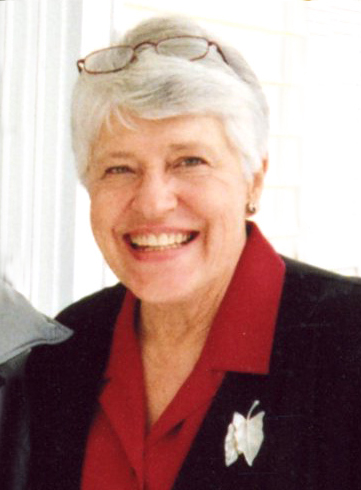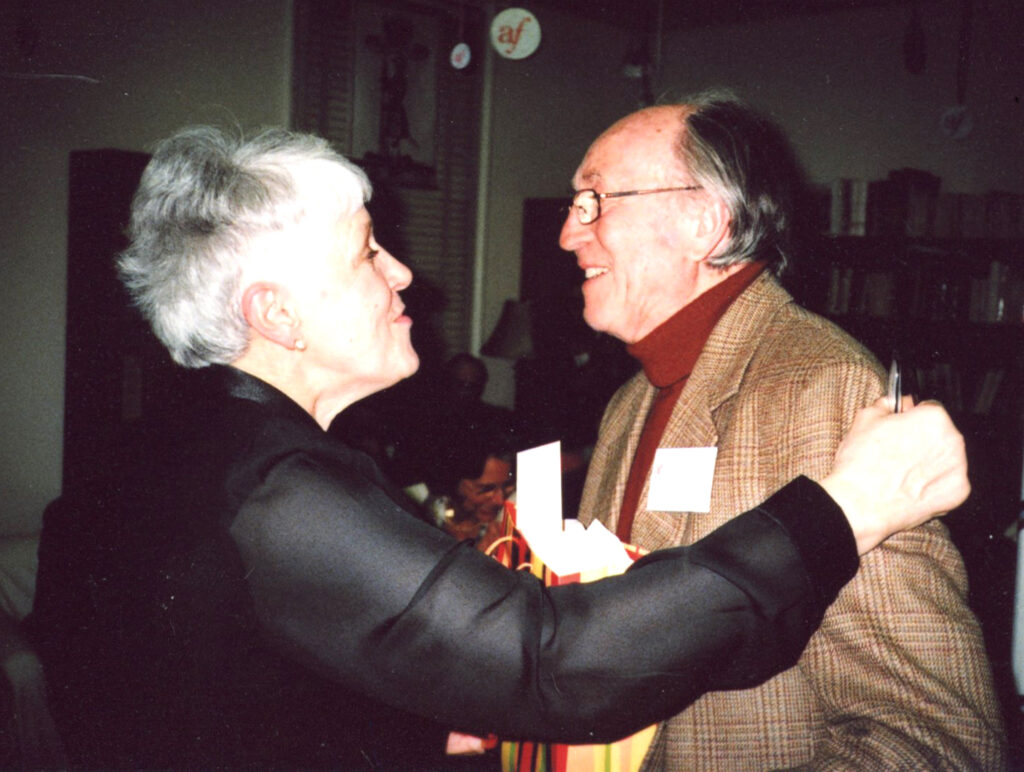Dates: 1939-2010
Role at AFLCR: chair of education committee; second president, 2005-10
Born on February 25, 1939, Monique Renaud (later Martin) was the daughter of Alice and Rosaire Renaud of Hardwick, Vermont, the seventh of fifteen children. She grew up on the family farm surrounded by siblings, music, and her proud French Canadian family. She showed musical talent from an early age and studied voice and piano.
She graduated from Hardwick Academy around 1957 and earned a bachelor’s at Trinity College. In 1960 she joined the Soeurs Missionaires des Notre-Dame des Anges in Sherbrooke, Quebec. In 1966 she left that convent and returned to Vermont.
Monique married Jim Martin in 1967 and started a family in 1968. They lived in Georgia, Vermont, and had two sons. In 1970, Monique founded the Country School, a preschool and kindergarten in Georgia, in part to educate her own sons.
She was a parishioner at Ascension Church where she was also music director, organist, and choir director. She led the music ministry at weekly mass. She was a devout Catholic but also organized ecumenical events with Baptist and Methodist churches.
In 1992, she earned a master’s degree in French from the University of Vermont. Afterward she taught as an adjunct at UVM, at Saint Michael’s College, and at Norwich University. She also taught French at Missisquoi Valley Union High School.
At the AFLCR
Monique Martin was a member of the first board of the AFLCR (then the AFV-QC, or Alliance Française Vermont–Cercle Québécois), in 1998.
Amid its social gatherings and cultural activities, the AFV-CQ began to offer French-language classes. In the fall of 1999 and into 2000 it held beginners’ classes at the Book Rack at the Champlain Mill, across from Heritage Winooski gallery. Françoise Dehan recruited and supervised the teachers, who included Georgette Garbes Putzel, and prepared the curriculum. Eric Bataille prepared the brochures, handled student enrollment, did the clerical work, and kept the books. The Book Rack provided the venue and did the advertising. An Alliance membership fee of $20 was included with the tuition cost. The classes proved popular and enrollment sold out. In 2000 the offerings were expanded to include French for Travelers and Advanced Conversation.
But in February 2001 Book Rack decided to stop participating in the French classes. So the Alliance was faced with the question of whether it could hold classes on its own. Classes were the main source of income for most Alliances Françaises, but to go solo, the AFLCR would have to hire at least a part-time education director, develop classes, hire and supervise teachers, find an affordable space, handle advertising, and so on. It would amount to starting a school. It would be very time consuming, even if just a few classes were offered. The volunteers didn’t have time for that level of work.
Moreover, the AFLCR would need funding to cover salaries and other expenses. So they would have to fundraise and find sponsors. As of 1999 Rossignol was their only corporate sponsor (a $300 donation). They wanted to reach out to IBM, Bombardier, and others, but they lacked the necessary 501(c)3 status. So after 2001, for several years, the AFLCR offered no classes and limited itself to organizing social events.
Classes or no classes?
In June 2004 Bataille resigned as president. (He would continue to serve as treasurer for a few years.) The board searched for a replacement, but two months later they still hadn’t found anyone. So in August they voted to have an executive committee preside, consisting of Simon Barenbaum, Henry Weinstock, and Monique Martin, the so-called triumvirate.
On his departure, Eric questioned whether the AFLCR could succeed as an organization that was limited to holding social events only. He reminded the Alliance “to address the future of French language programs.” After all, language instruction was the primary mission of Alliances Françaises worldwide.
Around this time, the absence of class offerings was actually becoming a bit awkward, as people kept contacting the AFLCR to ask about French classes. Inquiries made by phone, email, even in-person reflected a growing demand for classes, both for children and for adults. In October, in answer to the requests, Monique Martin called for the formation of an education committee to organize classes. The classes, she recommended, should be more structured than a conversation group but not too academic, with break-even tuition rates.
In 2005 Martin declared that the triumvirate wasn’t working and offered to take on the presidency herself. She was duly elected. Meanwhile Patrick Buffet joined the board: newly retired from IBM, he was serving as honorary French consul in Vermont. And the board invited Linda Pervier, a Shelburne Museum development officer who had recently earned an MA in French at UVM, to join as well.
The pressure to offer classes increased further as the Champlain Quadricentennial drew near. The 2009 anniversary would be an occasion to celebrate both Canadian Francophony and continental French heritage. All the publicity could raise the AFLCR’s visibility. The approaching anniversary spurred the effort to resume teaching.
Starting in 2006 the AFLCR underwent rapid development, led by a board consisting of Simon Barenbaum, Patrick Buffet, Eric Bataille, Françoise Chevalier, Weston Donehower, Hugh Harley, Roger Léger, Monique Martin, Linda Pervier, Dana vanderHeyden, and Henry Weinstock.
Space at Saint Michael’s
In March 2006, President Martin asked Marc vanderHeyden, president of Saint Michael’s College, if the college might have an affordable space that the AFLCR could rent. It would need to be large enough for classes, offices, a library, and a reading room. St. Mike’s did, and in the spring of 2007 the AFLCR leased a second-floor space in the Dupont building at the Ethan Allen Office Complex in Colchester, at a modest monthly rate. Having a home, said Monique, created “a palpable sense of excitement among our board and education committee members.” It was enough to begin classes. In late 2007 or early 2008 the AFLCR threw a party to inaugurate the new space. Even Francois Gauthier, the consul general of France in Boston, attended.
Classes
In July an education committee was finally formed to direct the education plans. Then in the fall of 2007, the AFLCR offered two 8-week courses: Beginning and Intermediate French. With minimal advertising, they enrolled 5 beginners and 11 intermediate level students.
Monique Martin, the president, doubled as the instructor—she taught both classes. She had taught French professionally for 25 years, and now she did it here, for a reduced salary, to get the program on a solid pedagogical footing. She also functioned as de facto education director. She even provided the textbooks (Bienvenue, published by Glencoe) from her personal library.
The students were young people people of French heritage who kneed a brush-up or a review but could not or did not wish to attend university classes; native speakers who valued stimulating discussion in their mother tongue; and others who simply craved French proficiency or fluency.
You can watch President Martin talk about the new classes in this 2007 video.
Tragically, Monique Martin’s story at the ALFCR ended prematurely—she died of cancer in 2010. Students at the AFLCR are in her debt for bringing the dream of French-language classes back into reality.
If you have memories of Monique Martin or her accomplishments that you would like to share, please write to us at info@aflcr.org.

